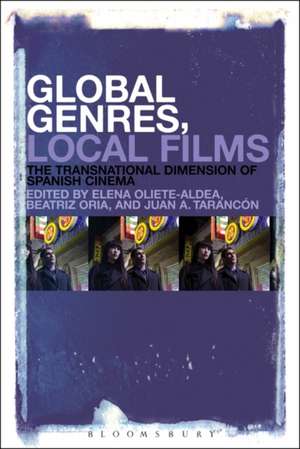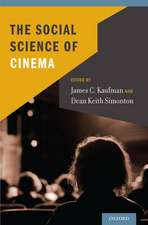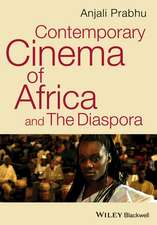Global Genres, Local Films: The Transnational Dimension of Spanish Cinema
Editat de Elena Oliete-Aldea, Beatriz Oria, Professor Juan A. Tarancónen Limba Engleză Paperback – 28 iun 2017
Toate formatele și edițiile
| Toate formatele și edițiile | Preț | Express |
|---|---|---|
| Paperback (1) | 258.24 lei 43-57 zile | |
| Bloomsbury Publishing – 28 iun 2017 | 258.24 lei 43-57 zile | |
| Hardback (1) | 832.99 lei 43-57 zile | |
| Bloomsbury Publishing – 16 dec 2015 | 832.99 lei 43-57 zile |
Preț: 258.24 lei
Preț vechi: 295.76 lei
-13% Nou
Puncte Express: 387
Preț estimativ în valută:
49.41€ • 51.73$ • 40.89£
49.41€ • 51.73$ • 40.89£
Carte tipărită la comandă
Livrare economică 07-21 aprilie
Preluare comenzi: 021 569.72.76
Specificații
ISBN-13: 9781501320163
ISBN-10: 1501320165
Pagini: 296
Dimensiuni: 152 x 229 x 21 mm
Greutate: 0.4 kg
Ediția:NIPPOD
Editura: Bloomsbury Publishing
Colecția Bloomsbury Academic
Locul publicării:New York, United States
ISBN-10: 1501320165
Pagini: 296
Dimensiuni: 152 x 229 x 21 mm
Greutate: 0.4 kg
Ediția:NIPPOD
Editura: Bloomsbury Publishing
Colecția Bloomsbury Academic
Locul publicării:New York, United States
Caracteristici
Includes contributions from internationally established scholars, Hispanists as well as film and cultural studies scholars, providing a multifaceted perspective on film production in Spain
Notă biografică
Elena Oliete-Aldea is Lecturer at the Department of English of the University of Zaragoza, Spain. Her work has been published in scholarly journals like Studies in Popular Culture, Culture Unbound, Studies in Spanish and Latin American Cinemas. She is co-editor of Culture and Society in the Age of Globalisation (2005) and author of Hybrid Heritage on Screen, the Raj Revival in the Thatcher Era (2015). Beatriz Oria is Lecturer at the Department of English of the University of Zaragoza, Spain, where she teaches Film Analysis. She has published articles in scholarly journals like The Journal of Popular Film and Television, The Journal of Popular Culture or Journal of Popular Romance Studies. She is the co-editor of Intimate Explorations: Readings Across Disciplines (2009) and the author of Talking Dirty on 'Sex and the City': Romance, Intimacy, Friendship (2014).Juan A. Tarancón is Lecturer at the Department of English of the University of Zaragoza, Spain. His work has appeared in CineAction, Cultural Studies, The Quarterly Review of Film and Video, New Cinemas: Journal of Contemporary Film, and in varied Spanish books and scholarly journals.
Cuprins
Foreword Spanish Cinema and the National/Transnational Debate: A Brief ReflectionBarry Jordan, De Montfort University, UKIntroductionElena Oliete, Beatriz Oria and Juan Tarancón, Universidad de Zaragoza, Spain Part I: Rethinking Spanishness: The Soft Edges of Early CinemaThe Tuneful 1930s: Spanish Musicals in a Global ContextValeria Camporesi, Universidad Autónoma de Madrid, SpainHistorical Films during the First Years of the Franco Regime and Their Transnational ModelsVicente José Benet, Universitat Jaume I, SpainRealism, Social Conflict and the Rise of Crime Cinema in Francoist SpainJuan Tarancón, Universidad de Zaragoza, SpainLuis Lucia's Lola la piconera (1951): Hybridity, Politics, Entertainment Federico Bonaddio, King's College, London, UKNothing Ever Happens: Juan Antonio Bardem and the Resignification of Hollywood Melodrama (1954-1963)Daniel Mourenza, The University of Leeds, UKPart II: Broadening Perspectives: Crossing Borders, Crossing GenresCarlos Saura's Stress es tres, tres (1968): A New Spanish Cinema with French and American Influences?Arnaud Duprat de Montero, Université Rennes 2, FranceViolence, Style and Politics: The Influence of the Giallo in Spanish Cinema of the 1970sAndy Willis, University of Salford, UKSpanish Gothic Cinema: The Hidden Continuities of a Hidden GenreAnn Davies, University of Stirling, UKRe-framing Empire: Mediating Encounters and Resistance in Spanish Transatlantic Cinema Since 1992Noelia Saenz, University of Southern California, USA The Transnational Dimension of Contemporary Spanish Road MoviesCarmen Indurain Eraso, Universidad Pública de Navarra, SpainRural Spain as a Transnational Space for Reflection in Icíar Bollaín's Flores de otro mundo (1999)Chantal Cornut-Gentille D'Arcy, Universidad de Zaragoza, SpainPart III: Appropriating the Global: Self-Conscious TransnationalismIsn't it Bromantic?: New Directions in Contemporary Spanish Comedy Beatriz Oria, Universidad de Zaragoza, Spain Malamadres and Bertomeus: Transnational Crime Film and TelevisionLuis M. García-Mainar, Universidad de Zaragoza, SpainLocal Responses to Universal Sufferings in Isabel Coixet's Transnational MelodramasHilaria Loyo, Universidad de Zaragoza, SpainTransnational Contours and Representation Models in Recent Films about Immigration in SpainAlberto Elena and Ana Martín Morán, Universidad Carlos III, SpainTransnational Identities in Galician Documentary Film: Alberte Pagán's Bs. As. (2006) and Xurxo Chirro's Vikingland (2011)Iván Villarmea Álvarez, Universidad de Zaragoza, Spain(In)Visible Co-productions, Spanish Cinema, the Market and the Media Vicente Rodríguez Ortega, Universidad Carlos III, Spain
Recenzii
An indispensable source ... Rigorously researched, well-reasoned and organized, and elegantly written, these thought-provoking essays considerably further the study of Spanish Cinema and film in general.
A lively and engaging, wide-ranging survey of Spanish cinema in its local, global, industrial and intercultural contexts, one that is loaded with provocative analyses of key films and genres and keen to re-articulate their relationship with World cinema.
Historically-grounded but never historicist, in its consistent acknowledgement of the importance of power relations in cultural production Global Genres, Local Films usefully complicates the term 'transnational,' thereby rescuing it from the apolitical platitudes by which is all too frequently rendered. This book is destined to make a significant contribution to Spanish film studies.
This book brings to English-speaking readers some impeccably researched and lucidly written essays by important European film historians. Their rich and diverse film readings demonstrate the authors' deep knowledge of Spanish cinema and its contexts, bringing forward original objects of analysis and tackling films that are seldom discussed. The volume makes a fresh contribution to the debates about national and transnational paradigms and will fascinate researchers and students alike.
A lively and engaging, wide-ranging survey of Spanish cinema in its local, global, industrial and intercultural contexts, one that is loaded with provocative analyses of key films and genres and keen to re-articulate their relationship with World cinema.
Historically-grounded but never historicist, in its consistent acknowledgement of the importance of power relations in cultural production Global Genres, Local Films usefully complicates the term 'transnational,' thereby rescuing it from the apolitical platitudes by which is all too frequently rendered. This book is destined to make a significant contribution to Spanish film studies.
This book brings to English-speaking readers some impeccably researched and lucidly written essays by important European film historians. Their rich and diverse film readings demonstrate the authors' deep knowledge of Spanish cinema and its contexts, bringing forward original objects of analysis and tackling films that are seldom discussed. The volume makes a fresh contribution to the debates about national and transnational paradigms and will fascinate researchers and students alike.















